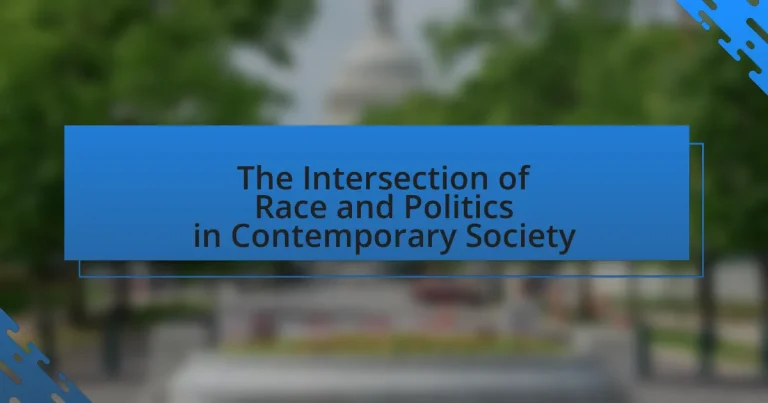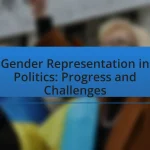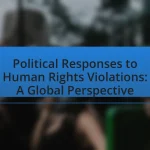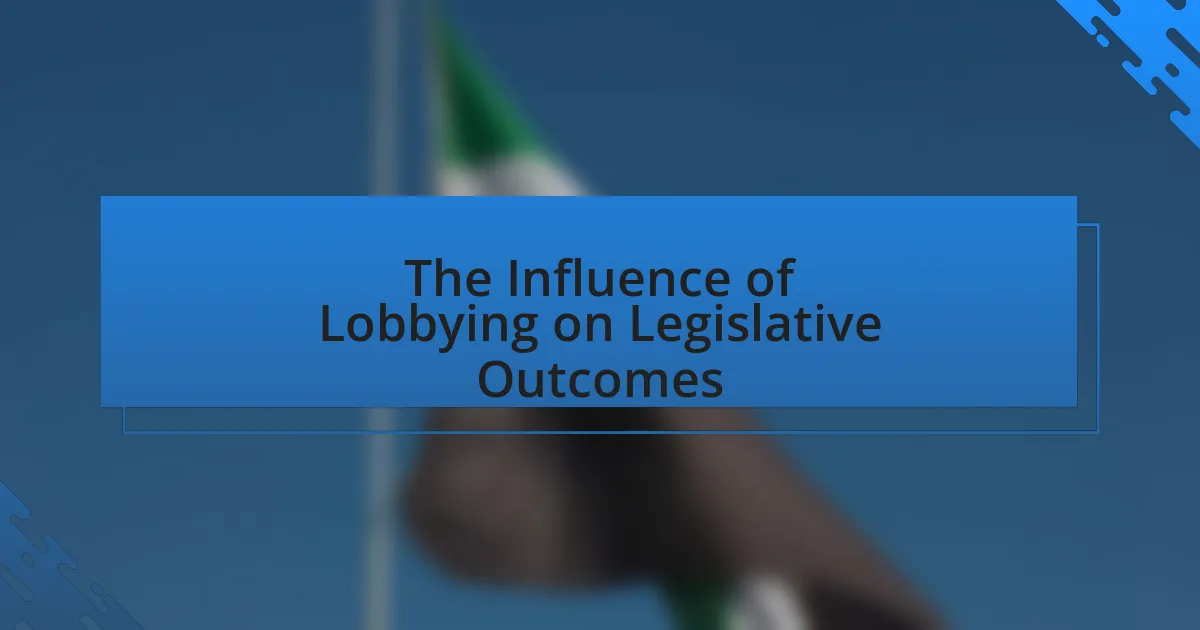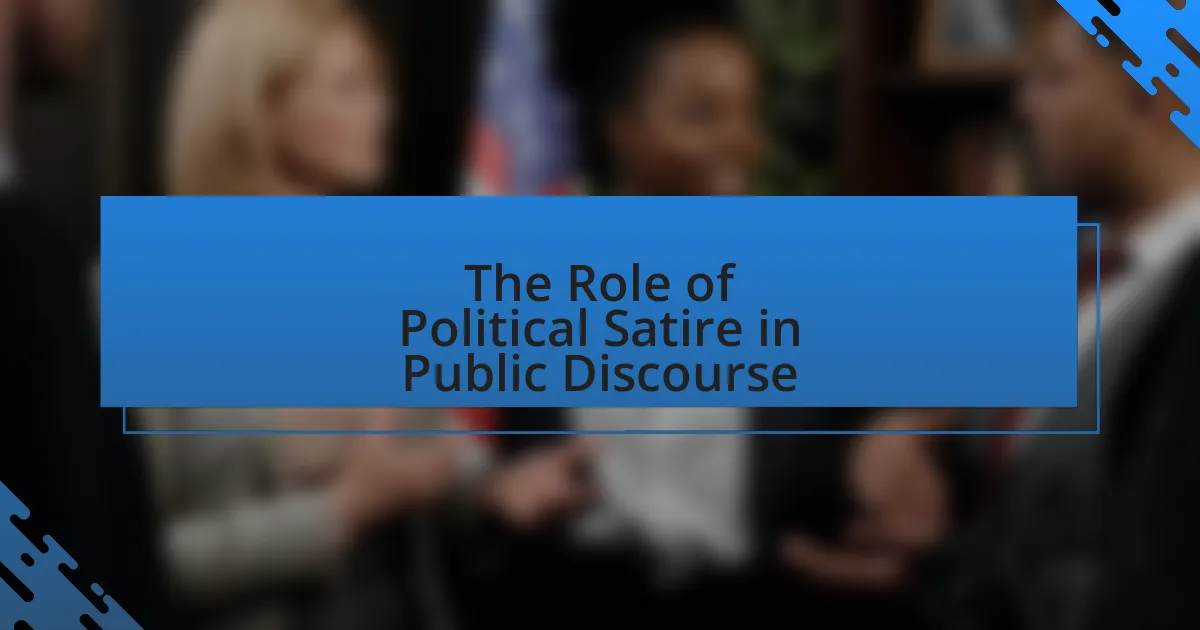The article examines the intersection of race and politics in contemporary society, highlighting how racial identities and issues influence political behavior, policy-making, and governance. It discusses the impact of racial demographics on voting patterns, as evidenced by the 2020 U.S. presidential election, where a significant majority of Black voters supported Joe Biden. The article also explores historical factors contributing to current dynamics, the role of systemic racism, and the implications for social justice movements. Additionally, it addresses challenges such as voter suppression and unequal representation, while emphasizing the importance of inclusive policies and grassroots movements in promoting racial equity within political processes.
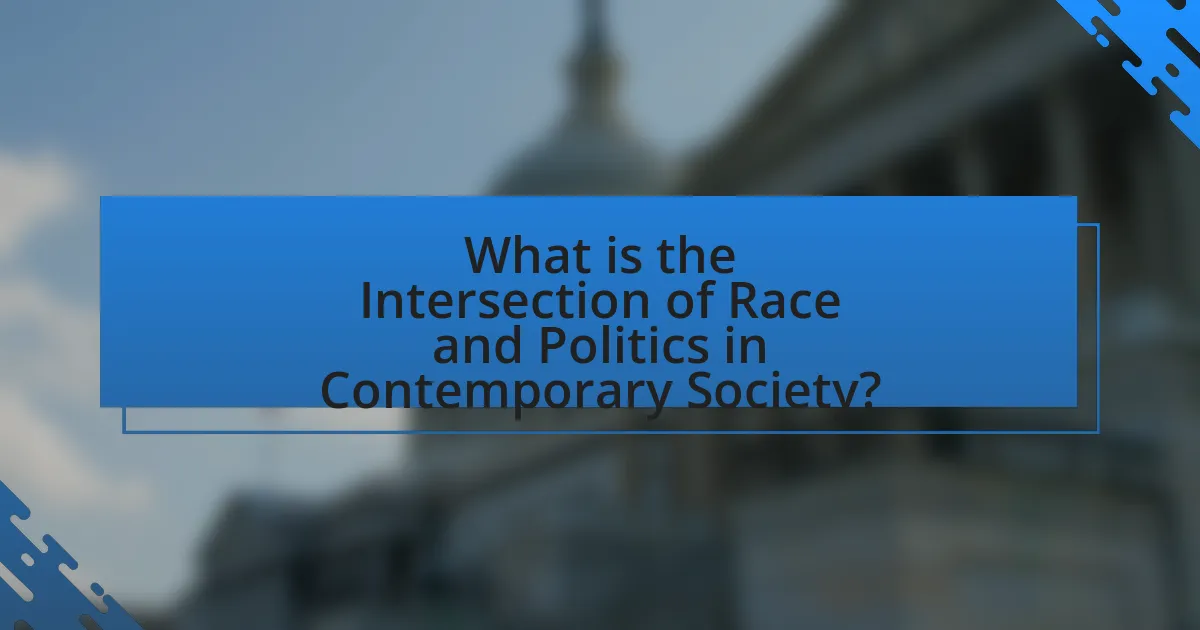
What is the Intersection of Race and Politics in Contemporary Society?
The intersection of race and politics in contemporary society refers to how racial identities and issues influence political behavior, policy-making, and governance. This dynamic is evident in electoral politics, where racial demographics significantly impact voting patterns and party alignment; for instance, in the 2020 U.S. presidential election, 87% of Black voters supported Joe Biden, highlighting the critical role race plays in electoral outcomes. Additionally, systemic racism and social justice movements, such as Black Lives Matter, have shaped political discourse and policy reforms, pushing issues of racial equity to the forefront of political agendas. These factors illustrate that race is not merely a social construct but a pivotal element that shapes political landscapes and influences the experiences of marginalized communities in contemporary society.
How does race influence political behavior and decision-making?
Race significantly influences political behavior and decision-making by shaping individuals’ identities, experiences, and perceptions of political issues. Research indicates that racial identity often informs voting patterns, party affiliation, and policy preferences, as seen in the 2020 U.S. presidential election where 87% of Black voters supported Joe Biden, reflecting a collective response to systemic racism and social justice issues. Additionally, studies show that racial minorities are more likely to prioritize issues such as police reform and healthcare access, which directly impact their communities. This influence is further evidenced by the mobilization of racial groups around specific candidates or causes, demonstrating how race can drive political engagement and activism.
What historical factors contribute to the current dynamics of race and politics?
Historical factors such as colonialism, slavery, and civil rights movements significantly contribute to the current dynamics of race and politics. Colonialism established racial hierarchies that persist today, while slavery created systemic inequalities that have long-lasting effects on socioeconomic status and political representation for marginalized groups. The civil rights movements of the 20th century, particularly in the United States, challenged discriminatory laws and practices, leading to legal advancements like the Civil Rights Act of 1964, which aimed to dismantle institutional racism. These historical events shape contemporary political discourse, influencing voter behavior, policy-making, and the ongoing struggle for racial equality.
How do racial identities shape political affiliations and voting patterns?
Racial identities significantly shape political affiliations and voting patterns by influencing individuals’ perspectives on social issues, party alignment, and candidate preferences. For instance, research indicates that African American voters predominantly align with the Democratic Party due to historical ties to civil rights movements and contemporary issues such as systemic racism and economic inequality. According to the Pew Research Center, in the 2020 presidential election, 87% of Black voters supported Joe Biden, reflecting a strong political alignment rooted in shared racial identity and collective experiences. Similarly, Hispanic voters exhibit diverse political affiliations influenced by factors such as immigration policy and economic opportunity, with a notable shift towards Democratic candidates in recent elections. This demonstrates that racial identities not only inform individual political beliefs but also collectively shape broader voting trends within specific demographic groups.
Why is understanding the intersection of race and politics important today?
Understanding the intersection of race and politics is crucial today because it shapes social dynamics, policy-making, and electoral outcomes. The political landscape is increasingly influenced by racial identities, as evidenced by the significant role that race plays in voter mobilization and representation. For instance, the 2020 U.S. presidential election highlighted how racial demographics can sway election results, with 87% of Black voters supporting Joe Biden, which was pivotal in key swing states. Additionally, systemic racism and inequality are central issues in contemporary political discourse, affecting legislation on healthcare, education, and criminal justice. Recognizing these intersections allows for more informed civic engagement and policy development that addresses the needs of diverse communities.
What implications does this intersection have for social justice movements?
The intersection of race and politics significantly impacts social justice movements by shaping their strategies and goals. This intersection influences the prioritization of issues, as marginalized racial groups often face unique challenges that require tailored approaches. For instance, the Black Lives Matter movement emerged in response to systemic racism and police violence, highlighting the need for intersectional advocacy that addresses both racial and political injustices. Research by the Pew Research Center indicates that 61% of Black Americans believe that racial discrimination is a major problem in society, underscoring the urgency for social justice movements to incorporate racial equity into their political agendas. Thus, the intersection of race and politics compels social justice movements to adopt a more inclusive framework that addresses the specific needs and experiences of diverse racial communities.
How does the intersection affect policy-making and governance?
The intersection of race and politics significantly influences policy-making and governance by shaping the priorities and perspectives of decision-makers. This intersection often leads to the creation of policies that address systemic inequalities, as evidenced by the implementation of affirmative action programs and anti-discrimination laws aimed at promoting equity. Research indicates that diverse representation in political offices correlates with more inclusive policy outcomes, as seen in studies conducted by the Center for American Progress, which highlight how minority legislators advocate for issues affecting their communities. Thus, the intersection of race and politics not only informs the legislative agenda but also impacts the effectiveness and fairness of governance.
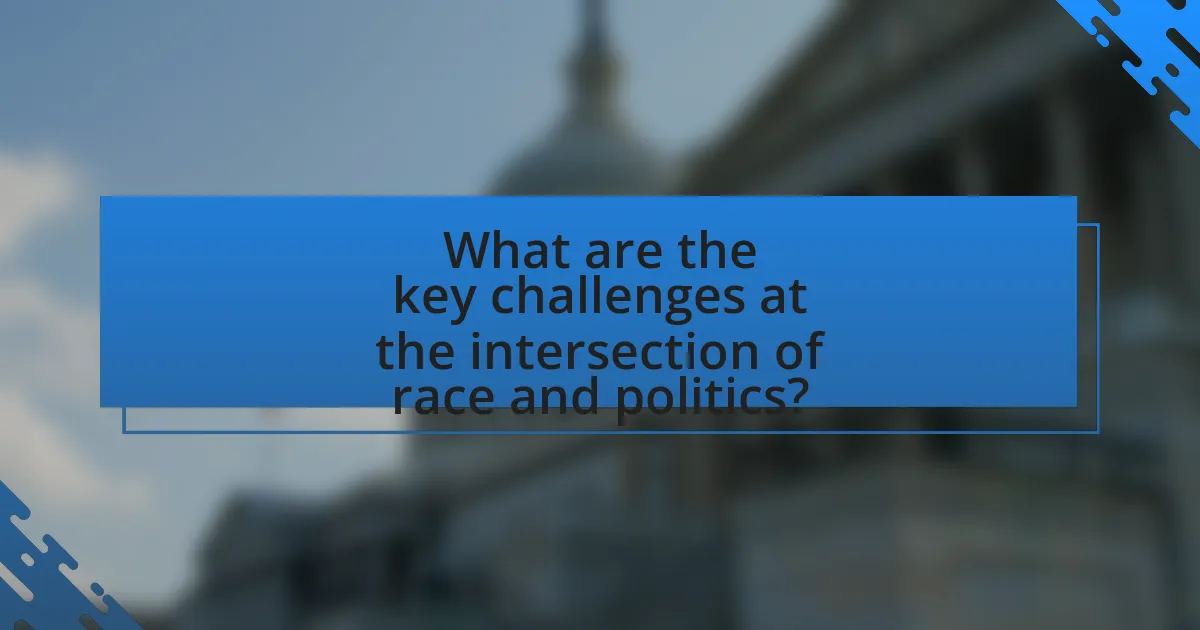
What are the key challenges at the intersection of race and politics?
Key challenges at the intersection of race and politics include systemic racism, voter suppression, and unequal representation. Systemic racism manifests in policies and practices that disproportionately affect racial minorities, leading to disparities in education, healthcare, and criminal justice. Voter suppression tactics, such as strict ID laws and gerrymandering, disproportionately impact communities of color, undermining their political power. Additionally, unequal representation in political offices results in a lack of advocacy for issues that affect marginalized groups, perpetuating cycles of inequality. These challenges are evidenced by studies showing that minority voters face significant barriers to participation, as highlighted in reports from organizations like the Brennan Center for Justice.
How do systemic racism and political structures interact?
Systemic racism and political structures interact by embedding racial inequalities within laws, policies, and institutional practices. Political structures often reflect and reinforce societal biases, leading to discriminatory outcomes in areas such as criminal justice, education, and housing. For example, the War on Drugs disproportionately targeted communities of color, resulting in higher incarceration rates among Black and Latino individuals, which illustrates how political decisions can perpetuate systemic racism. Additionally, voter suppression tactics, such as strict ID laws and gerrymandering, disproportionately affect minority populations, further entrenching racial disparities in political representation and power.
What role do institutions play in perpetuating racial inequalities?
Institutions play a significant role in perpetuating racial inequalities by embedding systemic biases within their structures and practices. For instance, educational institutions often implement policies that disproportionately affect students of color, such as zero-tolerance disciplinary measures that lead to higher suspension rates among Black students compared to their white peers. According to the U.S. Department of Education, Black students are suspended and expelled at rates three times greater than white students, highlighting how institutional policies can reinforce racial disparities. Additionally, the criminal justice system exhibits racial bias through practices like racial profiling and sentencing disparities, where studies show that Black individuals receive longer sentences than white individuals for similar offenses. These examples illustrate how institutions, through their policies and practices, contribute to the ongoing cycle of racial inequality in society.
How do political campaigns address or ignore racial issues?
Political campaigns address racial issues by incorporating them into their platforms, often highlighting policies aimed at racial equity, criminal justice reform, and economic opportunities for marginalized communities. For instance, during the 2020 U.S. presidential election, candidates like Joe Biden emphasized the need for systemic change in policing and support for minority-owned businesses, reflecting a direct engagement with racial issues. Conversely, some campaigns may ignore racial issues by focusing on broader economic or national security themes, thereby sidelining discussions on race. An example of this is when certain candidates avoid addressing the Black Lives Matter movement or fail to acknowledge the impact of systemic racism, which can alienate voters who prioritize these issues.
What are the effects of racial polarization in contemporary politics?
Racial polarization in contemporary politics leads to increased division among political parties and voter blocs, often resulting in heightened partisanship and social conflict. This polarization manifests in voting patterns, where racial and ethnic identities significantly influence electoral outcomes, as evidenced by the 2020 U.S. presidential election, where 87% of Black voters supported the Democratic candidate, while 57% of White voters supported the Republican candidate. Additionally, racial polarization contributes to the entrenchment of systemic inequalities, as policies may disproportionately favor one racial group over others, exacerbating social tensions and undermining social cohesion.
How does racial polarization impact voter turnout and engagement?
Racial polarization significantly decreases voter turnout and engagement among marginalized communities. Studies indicate that heightened racial divisions lead to feelings of disenfranchisement and alienation, particularly among minority voters. For instance, research from the Pew Research Center shows that in racially polarized environments, minority groups often perceive their votes as less impactful, resulting in lower participation rates. Additionally, the 2020 U.S. Census revealed that areas with high racial polarization experienced a 10% drop in voter turnout compared to more integrated regions. This trend underscores the detrimental effects of racial polarization on civic engagement and electoral participation.
What are the consequences of racial division on national unity?
Racial division significantly undermines national unity by fostering social fragmentation and conflict. When communities are divided along racial lines, it leads to a lack of trust and cooperation among different groups, which can manifest in increased tensions and violence. For example, the Civil Rights Movement in the United States highlighted how racial divisions led to widespread protests and unrest, ultimately necessitating legislative changes to address systemic inequalities. Additionally, studies show that countries with high levels of racial division often experience lower levels of civic engagement and political participation, as marginalized groups feel disenfranchised and excluded from the national narrative. This disconnection can weaken democratic institutions and hinder effective governance, as seen in various nations grappling with ethnic strife.
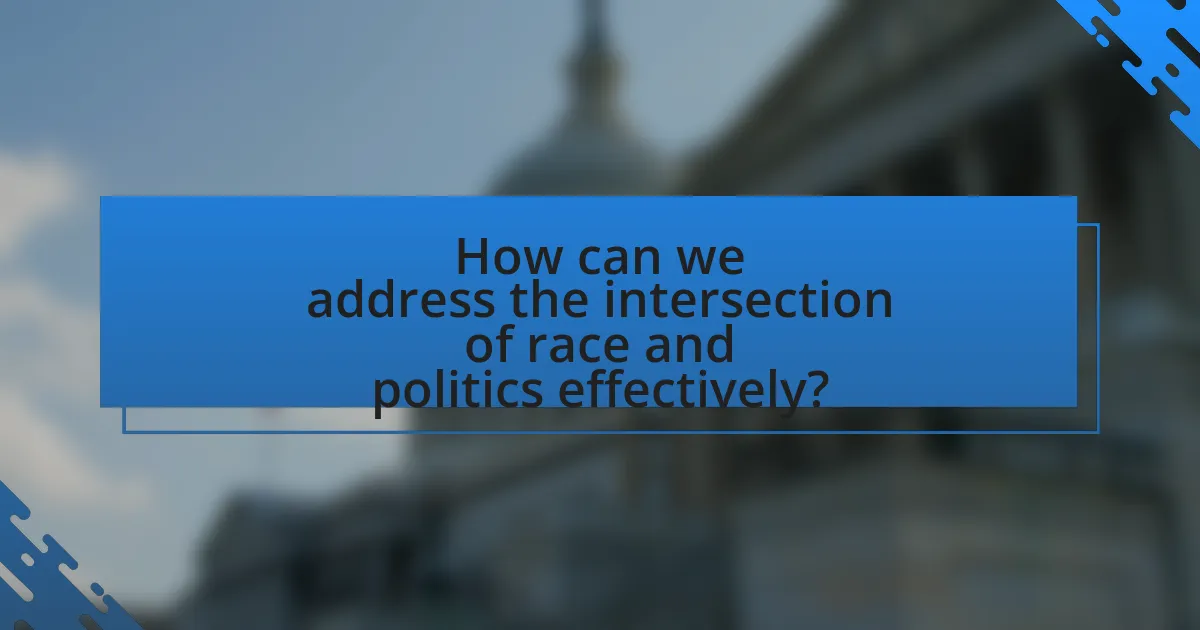
How can we address the intersection of race and politics effectively?
To address the intersection of race and politics effectively, it is essential to implement policies that promote equitable representation and participation of marginalized racial groups in political processes. Research indicates that diverse political representation leads to more inclusive policymaking, as seen in the increased advocacy for civil rights and social justice when minority groups hold office. For example, the 2018 midterm elections in the United States saw a record number of women and people of color elected to Congress, resulting in significant legislative efforts aimed at addressing systemic inequalities. Engaging communities through grassroots organizing and education can further empower individuals to influence political discourse and decision-making, thereby fostering a more equitable political landscape.
What strategies can be implemented to promote racial equity in politics?
To promote racial equity in politics, implementing inclusive policy-making processes is essential. This involves actively engaging underrepresented communities in political discussions and decision-making, ensuring their voices are heard and considered. For instance, the National Democratic Redistricting Committee emphasizes the importance of fair representation in electoral maps, which can significantly impact minority voting power. Additionally, establishing mentorship programs for aspiring politicians from diverse backgrounds can help increase their participation in political roles. Research shows that diverse leadership leads to more equitable policies, as seen in cities like San Francisco, where diverse city councils have enacted progressive reforms that address racial disparities.
How can grassroots movements influence political change regarding race?
Grassroots movements can influence political change regarding race by mobilizing communities, raising awareness, and advocating for policy reforms. These movements often highlight systemic injustices and demand accountability from political leaders, as seen in the Black Lives Matter movement, which has significantly impacted discussions on police reform and racial equity in the United States. Research indicates that grassroots activism can lead to tangible legislative changes; for example, after widespread protests in 2020, several cities implemented police reform measures, demonstrating the direct correlation between grassroots efforts and political action.
What role does education play in addressing racial issues in politics?
Education plays a crucial role in addressing racial issues in politics by fostering awareness, critical thinking, and informed civic engagement among individuals. Through education, individuals gain knowledge about historical injustices, systemic racism, and the importance of diversity in governance, which empowers them to challenge discriminatory practices and advocate for equitable policies. Research indicates that higher levels of education correlate with increased political participation and advocacy for racial equality, as educated individuals are more likely to engage in discussions about race and support policies aimed at reducing disparities. For instance, a study by the Pew Research Center found that college-educated individuals are more likely to recognize and address issues of racial inequality compared to those with lower educational attainment.
What best practices can individuals and organizations adopt to navigate this intersection?
Individuals and organizations can adopt best practices such as fostering open dialogue, promoting diversity, and implementing inclusive policies to navigate the intersection of race and politics effectively. Open dialogue encourages understanding and empathy, allowing individuals to share experiences and perspectives, which is crucial in addressing racial issues within political contexts. Promoting diversity within teams and leadership ensures that various viewpoints are represented, leading to more equitable decision-making processes. Implementing inclusive policies, such as equitable hiring practices and anti-discrimination training, helps create environments where all individuals feel valued and heard. These practices are supported by research indicating that diverse teams outperform homogeneous ones in problem-solving and innovation, as seen in studies by McKinsey & Company, which found that companies in the top quartile for racial and ethnic diversity are 35% more likely to have financial returns above their respective national industry medians.
How can political leaders engage with diverse communities effectively?
Political leaders can engage with diverse communities effectively by prioritizing inclusive dialogue and actively listening to the needs and concerns of various groups. This approach fosters trust and ensures that policies reflect the interests of all constituents. For instance, research from the Pew Research Center indicates that communities with higher levels of engagement in local governance report increased satisfaction with political representation. Additionally, leaders can utilize community forums, social media platforms, and outreach programs to facilitate direct communication, allowing for a broader understanding of cultural differences and specific challenges faced by diverse populations.
What resources are available for understanding and addressing racial issues in politics?
Resources available for understanding and addressing racial issues in politics include academic journals, books, online courses, and organizations dedicated to racial equity. Academic journals such as the “Journal of Race, Ethnicity, and Politics” provide peer-reviewed articles that analyze the intersection of race and political behavior. Books like “Righteous Discontent” by Evelyn Brooks Higginbotham and “The Color of Law” by Richard Rothstein offer historical context and insights into systemic racism in political structures. Online platforms like Coursera and edX offer courses on racial justice and political activism, while organizations such as the NAACP and Race Forward provide tools, research, and advocacy resources aimed at addressing racial disparities in politics. These resources collectively contribute to a deeper understanding of racial issues and inform strategies for effective political engagement.
